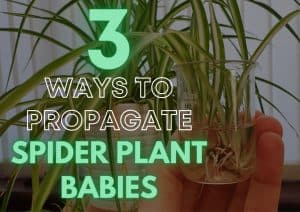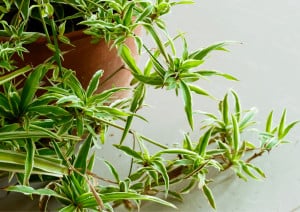Are Spiders Good For Houseplants? {ANSWERED}
-
Chris Dosser
- January 16, 2022
If you buy something using the retail links in our articles, sometimes we earn a small affiliate commission. This does not impact the products we recommend.
Houseplants are splendid to have in your home and office. The benefits they provide extend from lifting your mood to increasing productivity, far outweigh any drawbacks you may find to having leafy brethren sharing your space.
However, when you find that an itsy-bitsy spider has decided to take up residence in your favorite houseplant, you might begin to have second thoughts about keeping greenery indoors. Your ideas might even jump straight to bug spray.
Before you decide to spray away any eight-legged guests with insecticide, you should know that the majority of spiders choose to consume insects which could pose harm to your houseplants, such as gnats, aphids, mosquitos, and mites. This makes them beneficial for the health of you and your houseplants.
In fact spiders taking up residence in your plant pots may be playing a critical role in keeping your home or office free of uninvited pest guests, as well as other benefits to you and your pests.
This post will cover the benefits that can come from spiders in your houseplants, the most beneficial spiders to find in your home or office, and what things you can do to give the spiders using your houseplants as a home a more suitable living environment.
Sticking with pest control measures, we recently conducted an experiment to test whether the insecticides released by a flea fogger harm houseplants. You can learn if you should be removing houseplants before setting off a flea bomb here.
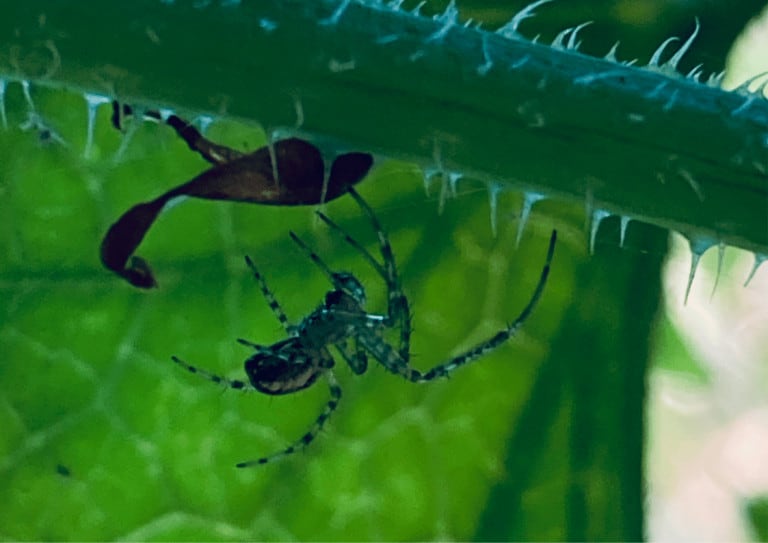
The benefits of spiders in your houseplants
Spiders, not spider mites (which is an entirely different issue), are generally a good thing in your houseplants, even if they give you the heebie-jeebies.
There are numerous reasons why you shouldn’t be worried if you find a spider or two living amongst your houseplants. Namely because spiders:
- eat pests
- reducing the need for chemical pesticides
- decrease house plant pathogens
Voracious appetites
The most prominent benefit to having a spider in your houseplant is the giant appetites these small guys possess. The favorite snacks preferred by spiders are likely the exact invasive pests that will destroy your houseplants (and drive you insane).
A few of the invasive insects harmful to indoor plants that spiders will consume are:
- Aphids
- Spider mites
- Mosquitos
- Beetles
- Ants
- Cockroaches
- Flies
- Moths
- And so many more
The one drawback to the voracious appetites of spiders is they don’t discriminate when it comes to consumption. Every insect is on the menu, regardless of its impact, positive or negative, on your houseplants.
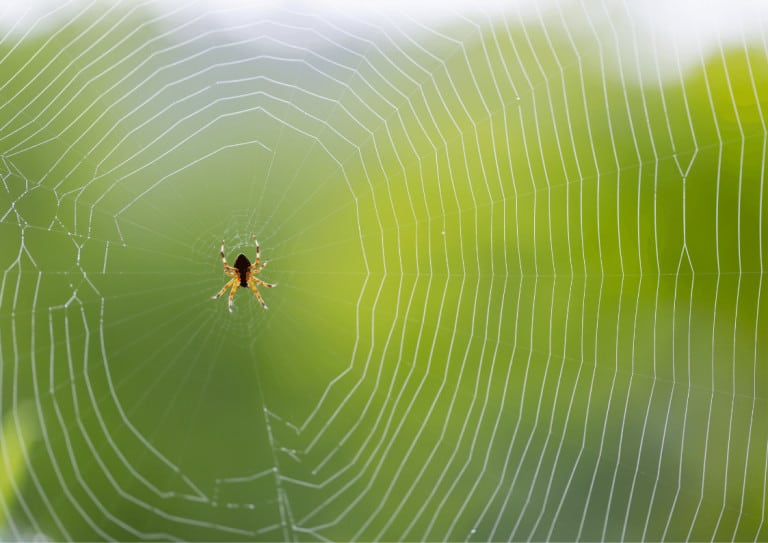
No need for chemicals
A resident spider and its immense appetite will reduce the need for indoor pesticides or insecticides. If you are concerned about using chemical means for pest control, a spider or two can take that worry away.
Reduced plant diseases
Whenever you have a pest issue with your houseplants, your plants will also become more vulnerable to disease and bacterial growth. Any injury caused by a plant pest will increase your plants’ risk of becoming diseased.
One diseased plant can result in losing all your plants. Fewer pests result in fewer plant pathogens. In turn, you will see a decrease in bacterial and fungal infections in your houseplants.
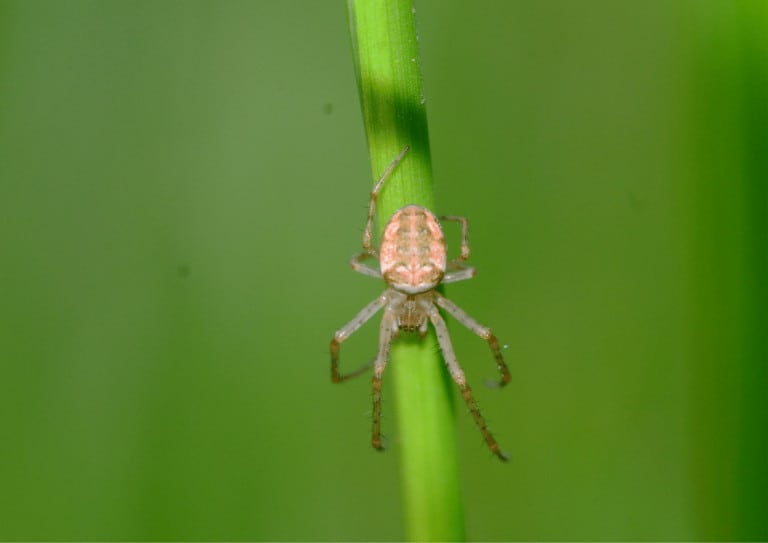
Spider families beneficial to houseplants
Except for dangerous spiders, such as the black widow or brown recluse, the vast majority of spiders will bring benefits to your houseplant collection. A few that carry a higher degree of benefit are:
- Orb weavers eat beetles, flies, moths, wasps, mosquitos, and other flying insects.
- Hunting spiders, like jumping spiders or crab spiders, typically do not spin webs but burrow into your houseplant’s soil. They eat crawling pests (like larvae and worms) and some flying pests.
- Dwarf spiders are tiny little hunters that spin sheet-like webs to capture pests in your home or office.
It is crucial to mention that just because most spiders you’ll find in your houseplants are beneficial and safe, not every spider you find inside is friendly or helpful. It is wise to always be cautious when encountering an eight-legged guest.
Though the vast majority of spiders pose no danger to you at all, this does not mean that they will not bite you if disturbed. Be purposefully mindful of sharing your space with an arachnid or two.
Creating a spidery environment
If you would like to take advantage of the host of benefits that having spiders living in your houseplants brings, there are a few things that you can do to create a more spider-friendly environment.
Tall plants
Weaving spiders (those who build webs) prefer taller plants where their webs can be securely anchored. Plants with tall stalks will provide a great “home” for your eight-legged pest control company.
Flowering plants
Hunting spiders, such as crab spiders, absolutely love flowers. Flowers can draw more pests, which provides your hunting spiders with an all-you-can-eat buffet of insects.
Extra mulch
Hunting spiders like to take down pests in your soil. By spreading an extra layer of mulch in the pots of your houseplants, you are essentially providing housing and cover for these little guys.
Organic mulch will not only provide a safe home for hunting spiders but improve the nutrient balance of your houseplant’s soil (two-for-one deal!).
Final thoughts
Regardless of whether you fear or dislike spiders, having spiders in your houseplants is actually a good thing. It is one surefire sign that your houseplants are thriving and providing a happening place for insects.
Spiders are there to take care of all the pesky bugs that want to make your houseplant their home. Allow them to do their job, chowing down on all the uninvited guests that want to wreak havoc on your plants.
Just be mindful and aware of sharing your space with spiders, which is likely happening whether you realize it or not, and enjoy the beauty they can share!

Chris Dosser
Co-Founder of Eden Indoors
Chris is a self-taught horticulturist with over a decade of experience caring for houseplants and creating lush, thriving indoor oases. He specializes in Monstera, and by self admission has a serious problem with buying and propagating rare indoor plants!
Similar Posts
3 Ways To Propagate Spider Plant Babies
Our adult spider plant has produced so many offsets that we had the chance to test several methods of propagating spider plant babies.
Should I Cut The Babies Off My Spider Plant?
Will spider plant babies or the mother plant suffer if spiderettes remain attached for too long? Is there any benefit to cutting them off? Answers here.

